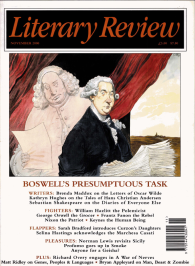Rosemary Ashton
Prince of Polemicists
The Quarrel of the Age: The Life and Times of William Hazlitt
By A C Grayling
Weidenfeld & Nicolson 384pp £25
The main thesis of this well-written, robust, sympathetic study of Hazlitt and his age is that he was a man both representative of and seriously at odds with the prevailing literary, political and social currents. In particular, he was the greatest quarreller of the early years of the nineteenth century. The characteristic Romantic mode of expression – to personalise the public and broadcast the private -is more evident in him than it is even in Coleridge, with his imaginative expressions of personal and existential guilt, or Wordsworth, whose greatest poem, The Prelude, is an epic exploration of the growth of his own mind. Hazlitt, although not a creative writer, is, as A C Grayling observes, ‘a completely autobiographical author, utterly himself in his writings’. Since most of his work took the form of periodical criticism, essays, or published lectures, this self-exposure expressed itself usually as polemic, although on one occasion, in his extraordinary Liber Amoris, it issued forth in a frank account of his near-insanity during a failed love affair.
In an age of political and critical nastiness, Hazlitt was the prince of polemicists. He could praise as well as blame, but he seldom did so without some spice of criticism. His most famous book of essays, The Spirit of the Age (1825), is full of marvellous insights into his

Sign Up to our newsletter
Receive free articles, highlights from the archive, news, details of prizes, and much more.@Lit_Review
Follow Literary Review on Twitter
Twitter Feed
How to ruin a film - a short guide by @TWHodgkinson:
Thomas W Hodgkinson - There Was No Sorcerer
Thomas W Hodgkinson: There Was No Sorcerer - Box Office Poison: Hollywood’s Story in a Century of Flops by Tim Robey
literaryreview.co.uk
How to ruin a film - a short guide by @TWHodgkinson:
Thomas W Hodgkinson - There Was No Sorcerer
Thomas W Hodgkinson: There Was No Sorcerer - Box Office Poison: Hollywood’s Story in a Century of Flops by Tim Robey
literaryreview.co.uk
Give the gift that lasts all year with a subscription to Literary Review. Save up to 35% on the cover price when you visit us at https://literaryreview.co.uk/subscribe and enter the code 'XMAS24'